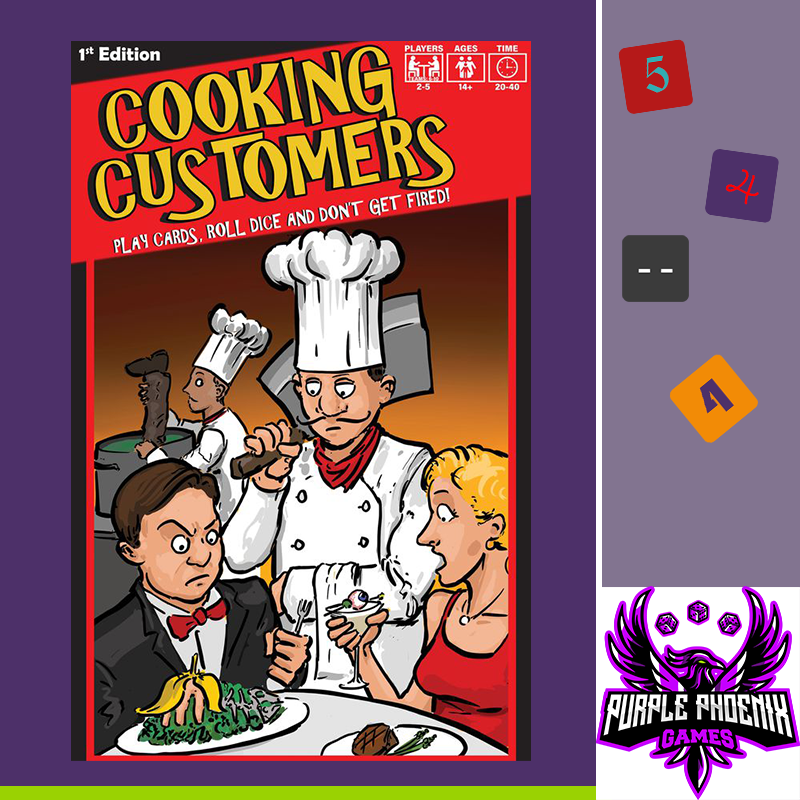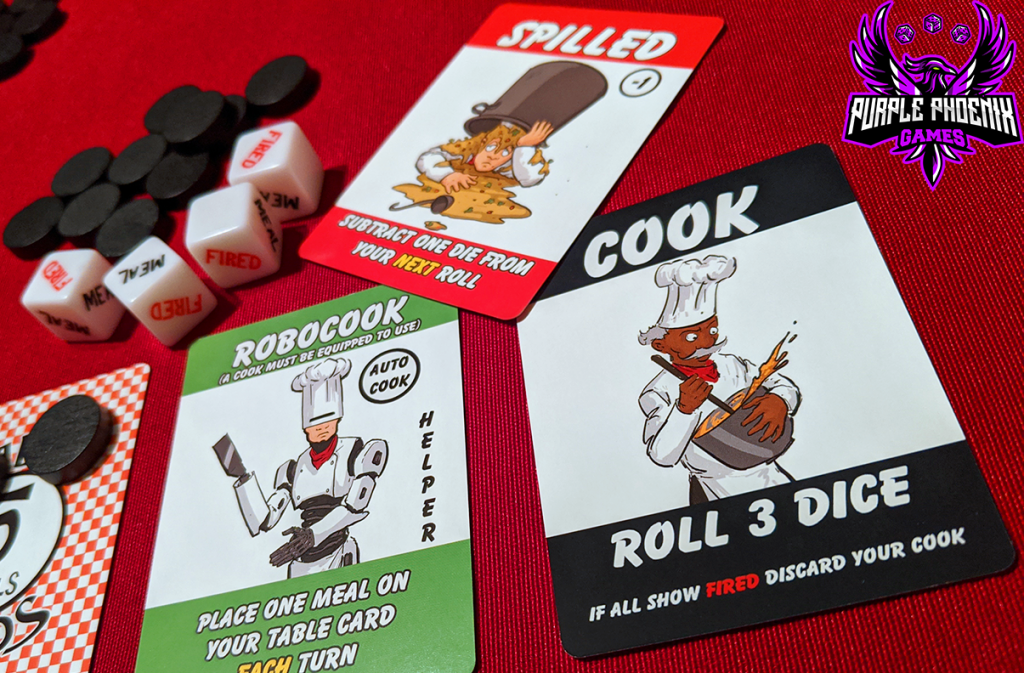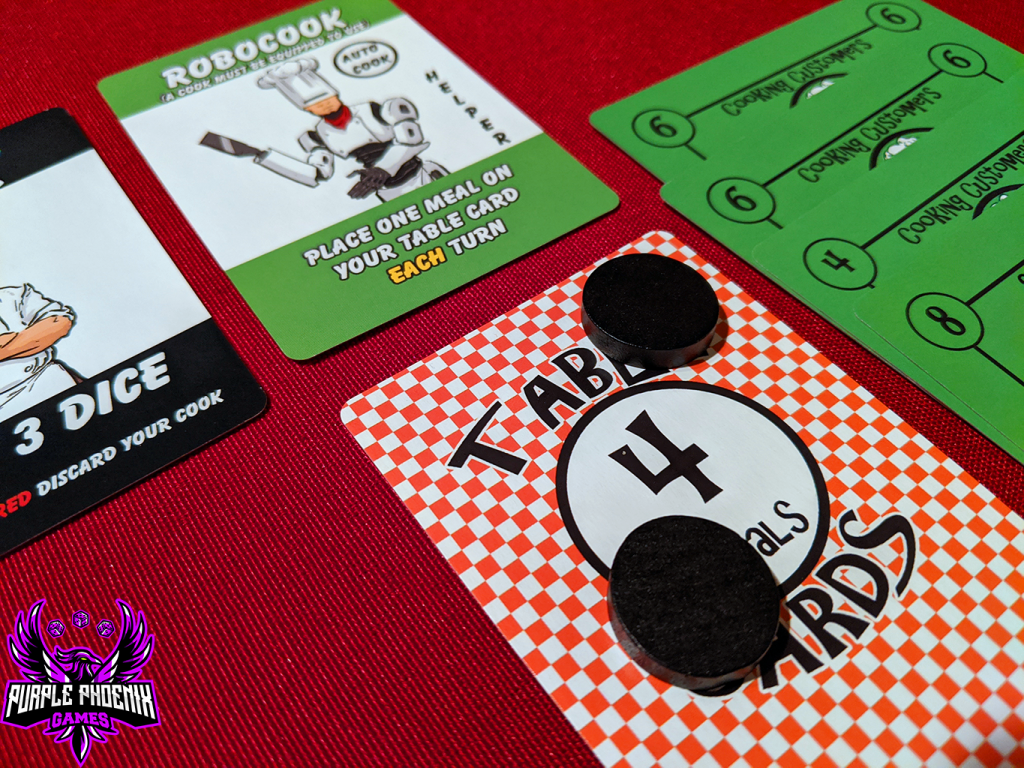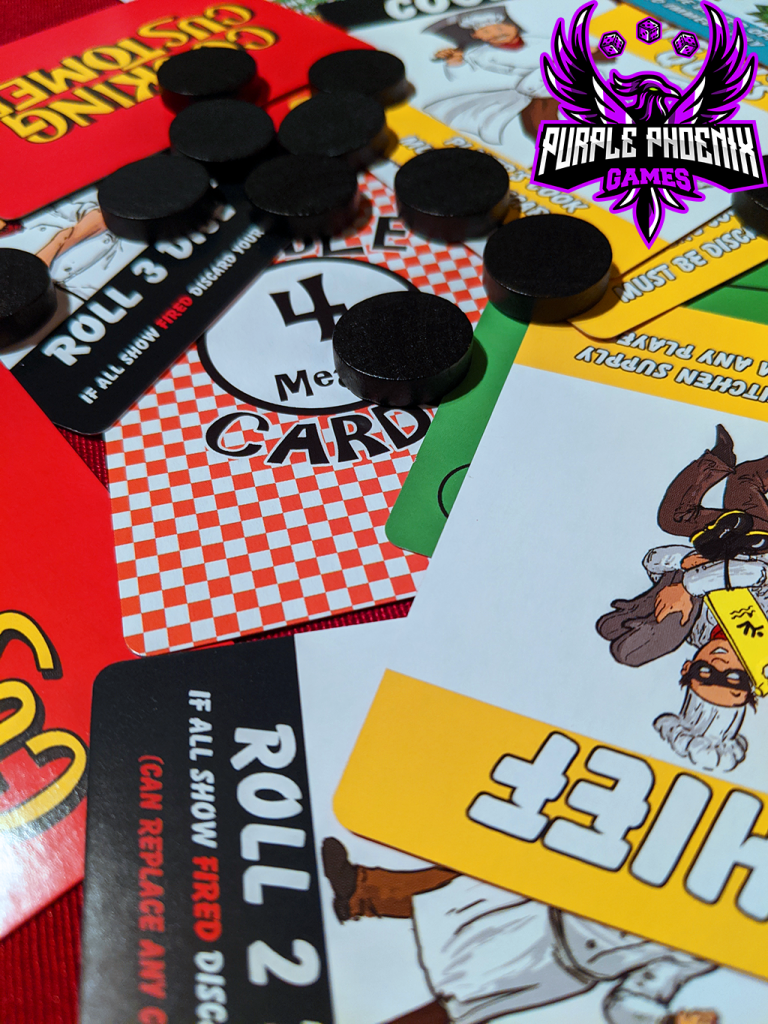
Raise your hand if you have ever worked in the food industry. Okay, I see a few hands. Now raise your hand if you have ever been so torqued by a customer that you wanted to cook them in a pie. Oh, thanks for your hand Mrs. Lovett. Good to know. Well this game is an experience of getting your money and getting out. Fastest one to do so will win, and if you have to stew a few eyeballs in the process, more power to you.
| Cooking Customers (2019) | Good Enough Games |
| 2-5 Players (2-10 in teams) | 20-40 minutes |
| Ages 14+ | BGG Weight – 2.00 / 5 |
DISCLAIMER: We were provided a copy of this game for the purposes of this review. This is a retail copy of the game, so what you see in these photos is exactly what would be received in your box. I do not intend to cover every single rule included in the rulebook, but will describe the overall game flow and major rule set so that our readers may get a sense of how the game plays. For more in depth rules, you may purchase a copy online or from your FLGS. -T
Cooking Customers is a card and dice game where the first player to amass $20 in “tips” will be crowned the winner. Players earn tips by serving enough meals to customers at each table. Players can receive meals by rolling them on dice, or by card manipulation. Let me explain.
To setup, place the meals (black discs) in the middle of the table for all to reach. Similarly, place all the dice nearby. These dice have three sides: FIRED, MEAL, and a blank side. Shuffle the mighty deck of cards and deal five to each player, placing the rest of the deck in the middle of the table. Finally, shuffle the Table cards and place somewhere near the other components. Players are now ready to begin!

On a player’s turn, they will first draw the topmost Table card to be placed in front of themselves. This card will show how many meals need to be served to it to be satisfied and earn tips. The Table cards will mostly just sit there in front of players collecting meal discs for the game’s duration. Once a Table card is drawn (and only one Table per player, please) the active player may then play cards from hand. A player may play one or two cards, but only one card may be played to the active player’s tableau, and only one card may be played on an opponent. Should a player not wish to play a card to anyone’s tableau, they must discard a card to the middle of the table. Then the active player will draw back to the hand size of five cards.
Cards played to other players are usually bad, Munchkin-esque cards that halt progression or just cause mayhem for their designs. I will not go into detail on these, as half the fun of this game is the Take-That of these cards. Cards played to a player’s own tableau can be a myriad choices: Cooks, Helpers, Kitchen Supplies, etc. The most important are the Cook cards. A player will need to have a Cook “hired” in front of them in order to participate in the next phase of the game: rolling dice. Players can have Helper cards (sous chefs) and Kitchen Supplies active without a Cook, but the player may not roll dice or serve meals without a Cook. Cooks and Helpers will dictate how many dice are rolled in the next phase of a turn, and rolling more dice is always better.
Once all cards have been played on a player’s turn, they may now roll the dice (though for a game with such a dark theme I say we use the “Roll Them Bones” colloquialism). When the dice are rolled, players are hoping for MEAL to show up on all dice. This is how a meal can be collected and served to the Table cards. However, if at any time all dice read FIRED then the player’s Cook is fired and they may not continue rolling dice. The Cook is discarded and play is forfeited to the next player. #cheflife amirite?
Once a Table card has all the meals it needs to be satisfied, the player may score it by flipping it over to reveal the amount in tips they have earned. Play continues in this fashion until one player has earned $20 in tips. They can then taunt the other players with their superiority.

Components. Cooking Customers is a BUNCH of cards, some painted wooden discs, and some embossed dice. The cards are good quality, the discs are good as well, and the dice are great. All the components are pretty darn good. The art, though gross at times, is really well-done (see what I did there) and kept us laughing throughout our plays.
I do have one qualm about this game: the rulebook. Though only six pages long and with lots of illustrations throughout, I found that reading it made me more confused than it should have. I did take the rulebook’s advice to go to the publisher’s website, goodenoughgames.com, and watch the rules explanation and playthrough. That helped immensely to clear up what the rulebook did to my brain.
All in all, we had a great time playing this one. We all like Munchkin, and though it is NOT Munchkin, Cooking Customers delivers a take-that dice and card game that really is worth checking out. If you are looking for something with a new theme that plays quickly and has some meat on its bones (and there), then we certainly recommend Cooking Customers. Purple Phoenix Games gives this one a hearty (food puns are too easy) 13 / 18. You can purchase a copy at goodenoughgames.com currently. While you’re there please watch the video.

